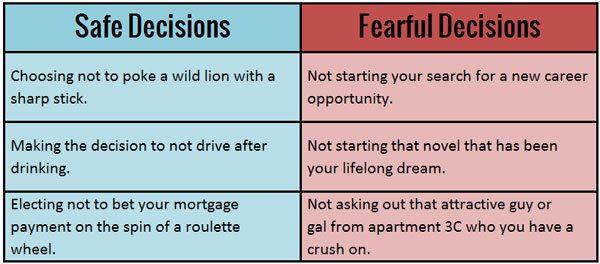Life
How Playing It Safe Can Ruin Your Life

Have you ever missed out on a great opportunity because you played it safe?
Think about it. Look back over your life and think about the things you could have done. The opportunities you could have taken, the people you could have befriended, the experiences you could have savoured.
But back then those things seemed scary and risky. Wanting to play it safe, you elected to stay in your comfort zone at the time.
From where you sit now, you can easily and clearly see that you should have acted upon some of those things. In retrospect, those things were scary or risky at all – just different and new. They were, in all actuality, blessings that you walked away from.
It’s a sobering and outright sad feeling, isn’t it?
Playing It Safe Isn’t About Safety At All
You’re not the only one who has done that. Most of us have a tendency to play it safe.
Some of us equate playing it safe with being sensible and prudent. But most of the time, it’s something else all together.
The real problem isn’t safety or risk at all. The real problem is fear.
As humans, we are hard-wired to allow fear into our decision making. Most of us simply don’t understand fear, where it comes from, or the role it plays in what we choose to do or not do.
By understanding it more, you can prevent fear from clouding your decision-making process.
It’s Not Brain Surgery
What if I were to tell you that there was a little tiny part of your brain that pre-wires you to avoid risk and play it safe? Well, there actually is.
It’s called the amygdala and it plays a big part in what motivates us to behave the way we do. One of the functions of the amygdala is processing emotions – particularly those associated with survival. Like the emotion of fear for instance.
When you are in a familiar situation that you know to be safe, your amygdala is happy and secure – and so are you. But when something new or seemingly risky comes along, the amygdala kicks into high gear. It lets you know, “Hey, we’re outside our comfort zone here. Retreat! Withdrawal!”
Sometimes that reaction can save your life. Other times it can hold you back from a more fulfilling life.
The trick is learning to know the difference between valid fears of very real danger to our safety – and invalid fears of something new.
Mauled or Embarrassed – The Choice Is Yours
There are basically two types of decisions we make when we perceive danger or consequences. The first type, I call safe decisions – which are survival based. They keep us alive and assure we have adequate food and shelter. The second type I refer to as fearful decisions – which tend to keep us from taking less life-threatening risks and prevent us from spreading our wings.
Let’s take a look at some examples of both.

Safe decisions come from a very real fear of severe consequences to your health, life, or quality of life – while fearful decisions come from someplace completely different.
Look at that right hand column. If any one of those scenarios goes as badly as it’s capable of going, what happens? Does anyone die, go to prison, or lose their shelter? No. As it turns out the things we fear most seem to be much more about our feelings than they are about very serious consequences.
“I am an old man and have known a great many troubles, but most of them have never happened.” – Mark Twain
Our Five Most Common Baseless Fears
In my professional life, I’ve noticed time and time again that there are five major feelings-based fears that people let trip them up on their path to a better life. You’ll notice that they’re all very closely related.
1: Fear of failure
Have you ever passed on an opportunity to try something truly exciting because you were afraid you might fail at it? I have. The ironic thing is the fact that if you don’t try, you’ve already failed. So there’s really not much to lose. And yet we talk ourselves into believing that by not risking failure we’re somehow better off.
2: Fear of rejection
If you pitched your idea to the boss, or asked out that cute girl you like, or submitted your novel to a publisher, you might get rejected – and rejection hurts. So instead of feeling that emotion, we limit our potential and call it “playing it safe.”
3: Fear of inadequacy
This one usually manifests itself as, “I’m not good enough to do this thing I really want to do.” While this fear doesn’t necessarily originate from survival instinct, it’s no less powerful than any of the others.
4: Fear of unworthiness
Closely related to the fear of inadequacy, the self-talk associated with the fear of unworthiness sounds like, “Who am I to think that I might achieve that thing?” It comes from a place of humility, which normally is a good thing. But it’s also self-deprecating and destructive.
5: Fear of further commitment
This one should sound familiar, because we’re all guilty of it from time to time. We don’t always pass on opportunity because we’re afraid that we’re not good enough. Sometimes we know darn well that we’re good enough, but the ramifications of succeeding and the additional commitment needed after success is achieved scare the bejesus out of us.
Fighting Emotion With Logic
So now that you know that these fears are normal and that you’re not the only one who struggles with them, the question becomes: What can you do to get over them?
I find that instead of fighting raw innate human fears head-to-head, it’s best to use logic to take their power away.
When you find yourself letting any of those fears stop you from bettering yourself, run yourself through these three questions:
1: What is the worst thing that could happen if I ignored my fear and did this?
Take out a pen and paper and list all the potential (realistic) consequences. Would there be a loss of life, health, or livelihood? Or is the real risk just having to temporarily deal with an uncomfortable emotion like rejection or embarrassment?
2: What is the absolute best thing that could happen if I ignored my fear and went for it?
List all these, too. How might your life be different? What things might you learn? Who might you have the opportunity to connect with?
3: Are the possible consequences under #1 worth the potential benefits under #2?
Take a good look at both lists and give this question some thought. If the consequence of a particular action is death and the upside is a 10% pay raise – then your choice is simple. Avoid death.
But if the consequence of your action is rejection and the potential benefit is your dream career, swallow your fear and go for it.
Logic Tames The Beast
I know this seems incredibly simple – and it is. It’s simple and obvious because we just took an emotional issue and made it logical.
When you take the emotional power away from your fear and look at the situation as data – good decisions become much easier.
Do me a favor. The next time you find yourself “playing it safe”, run yourself through this quick exercise. Reduce the emotional to the logical. Then come back and let us know how things turned out.
Time to speak up!
Share a time when you felt fearful but took the leap anyway. Or share a tip about taking calculated risks.
Life
Imposter Syndrome Is Rooted in Your Past But Here’s How You Can Rewire It
Imposter syndrome is most prevalent in highly successful women

Imposter syndrome is “the persistent inability to believe that one’s success is deserved or has been legitimately achieved as a result of one’s own efforts or skills.” (more…)
Life
The Surprising Mental Health Tool You Probably Haven’t Tried
Through journaling, I arrived at a more balanced perspective, it reinstated my sense of gratitude and led me to accept my disability

In two particularly difficult times in my adult life, my journaling practice is helping me heal emotionally. It has been a vital tool for helping me see the bigger picture and land in a place of gratitude. (more…)
Life
How to Stop Comparing Yourself to Others and Find True Happiness
Comparison is the thief of joy; it robs us of our happiness, self-esteem, and peace of mind

In today’s hyperconnected world, it’s easier than ever to fall into the trap of comparing ourselves to others. Social media platforms like Instagram, Facebook, and LinkedIn constantly bombard us with curated highlights of other people’s lives, making it seem like everyone else is happier, more successful, and more fulfilled than we are. (more…)
Life
Harness the ‘Battery Effect’ to Transform Life’s Tensions into Your Greatest Strength
Recharge your life batteries by shifting your mindset today

I believe our life capacity is determined by the skillsets we develop on this spinning rock we call Earth. By “life capacity,” I mean our ability to embrace and sustain joy. (more…)
-

 Success Advice4 weeks ago
Success Advice4 weeks agoThe One Mindset Shift That Made Me Irreplaceable At Work
-

 Did You Know3 weeks ago
Did You Know3 weeks ago7 Surprising Life Lessons Video Games Taught Me That School Never Did
-

 Success Advice3 weeks ago
Success Advice3 weeks agoHow Playing by the Rules Became the Smartest Business Strategy
-

 Success Advice3 weeks ago
Success Advice3 weeks agoHow to Build Trust, Kill Micromanagement, and Lead a Team That Thrives
-

 Scale Your Business3 weeks ago
Scale Your Business3 weeks agoHow to Build a Workplace People Actually Want to Show Up To
-

 Success Advice2 weeks ago
Success Advice2 weeks agoSuccess Isn’t Sexy: 5 Daily Habits That Actually Work
-

 Scale Your Business2 weeks ago
Scale Your Business2 weeks agoHow Smart Entrepreneurs Cut Financial Chaos in Half with One Simple Switch
-

 Success Advice2 weeks ago
Success Advice2 weeks agoBreaking the Bias: How Females Can Thrive In The Workplace in 2025






























24 Comments